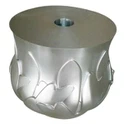Hey there! As an OEM CNC parts supplier, I often get asked about the thermal expansion properties of our parts. So, today I'm gonna dive into the question: Do OEM CNC parts have a low coefficient of thermal expansion?
First off, let's talk a bit about what thermal expansion is. Thermal expansion is the tendency of matter to change in volume in response to a change in temperature. The coefficient of thermal expansion (CTE) is a measure of how much a material expands or contracts when its temperature changes. A low CTE means that the material doesn't expand or contract much with temperature variations, which can be crucial in many applications.
Now, when it comes to OEM CNC parts, the answer to whether they have a low CTE isn't a simple yes or no. It really depends on the materials used to make the parts. We use a variety of materials in our CNC machining process, each with its own unique CTE.
One of the common materials we work with is aluminum alloy. Aluminum is a popular choice for CNC machining due to its lightweight, high strength-to-weight ratio, and excellent machinability. However, aluminum generally has a relatively high CTE compared to some other materials. For example, the CTE of pure aluminum is around 23.1 x 10^-6 /°C. This means that for every degree Celsius increase in temperature, a piece of aluminum will expand by about 23.1 millionths of its original length.
But don't worry! Just because aluminum has a relatively high CTE doesn't mean it can't be used in applications where low thermal expansion is important. We can use techniques like Custom High precision Aluminum Alloy CNC Machining Aluminium Machining to optimize the design and manufacturing process to minimize the effects of thermal expansion. For instance, we can use proper heat treatment processes to improve the dimensional stability of the aluminum parts.
Another material we often use is stainless steel. Stainless steel has a lower CTE compared to aluminum. The CTE of stainless steel varies depending on the specific grade, but it's generally in the range of 10 - 17 x 10^-6 /°C. This makes stainless steel a better choice for applications where low thermal expansion is critical, such as in precision instruments and aerospace components. We offer Custom Stainless Steel Aluminium CNC Machine Parts for Automotive that are designed to meet the strict requirements of these industries.
In addition to aluminum and stainless steel, we also work with other materials like titanium, brass, and plastics, each with their own CTE characteristics. Titanium, for example, has a relatively low CTE (around 8.6 x 10^-6 /°C), making it suitable for applications where high strength and low thermal expansion are required, such as in the aerospace and medical industries.


So, as you can see, whether OEM CNC parts have a low CTE depends on the materials we choose and the specific requirements of the application. At our company, we understand the importance of thermal expansion in different applications, and we have the expertise to select the right materials and manufacturing processes to meet your needs.
Let's take a look at some real - world applications where the CTE of CNC parts matters. One such application is in the automotive industry. CNC machining part used for automotive devices need to be dimensionally stable under a wide range of temperatures. For example, engine components are exposed to high temperatures during operation. If the parts have a high CTE, they may expand and cause clearance issues, leading to reduced performance or even mechanical failure. That's why we carefully select materials and use advanced machining techniques to ensure that our automotive CNC parts have the appropriate thermal expansion properties.
In the electronics industry, thermal expansion can also be a major concern. Electronic components generate heat during operation, and if the surrounding CNC - machined parts expand too much, it can cause misalignment, short circuits, or other problems. We offer CNC parts for electronics that are designed to have low CTE to ensure the reliability and performance of the electronic devices.
When it comes to precision engineering, such as in the manufacturing of optical instruments or semiconductor equipment, the tolerance for thermal expansion is extremely low. Even a small amount of expansion or contraction can affect the accuracy and functionality of these high - precision devices. We have the capabilities to produce CNC parts with tight tolerances and low CTE to meet the demanding requirements of these industries.
So, if you're in need of OEM CNC parts and thermal expansion is a concern for your application, don't hesitate to reach out to us. We have a team of experienced engineers and technicians who can work with you to select the best materials and manufacturing processes for your specific needs. We'll make sure that the parts we produce have the right CTE to ensure the optimal performance and reliability of your products.
In conclusion, the coefficient of thermal expansion of OEM CNC parts can vary widely depending on the materials used. But with our expertise and advanced manufacturing capabilities, we can provide you with high - quality CNC parts that meet your thermal expansion requirements. Whether you need parts for automotive, electronics, or precision engineering applications, we've got you covered. So, why not start a conversation with us today to discuss your project?
References
- "Materials Science and Engineering: An Introduction" by William D. Callister, Jr.
- "CNC Machining Handbook" by various authors in the field of machining technology.






